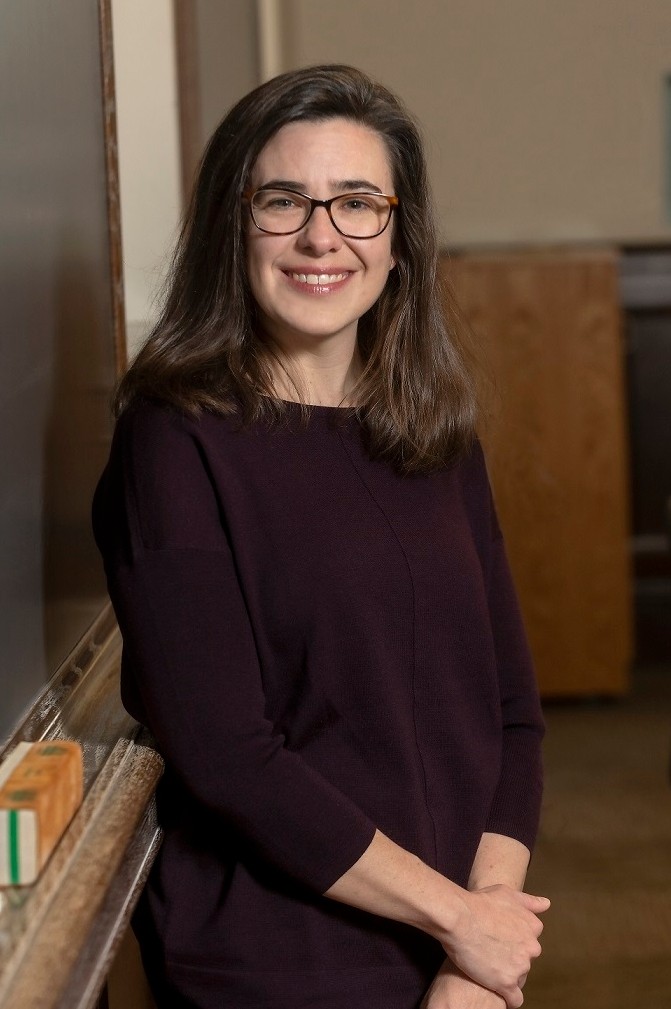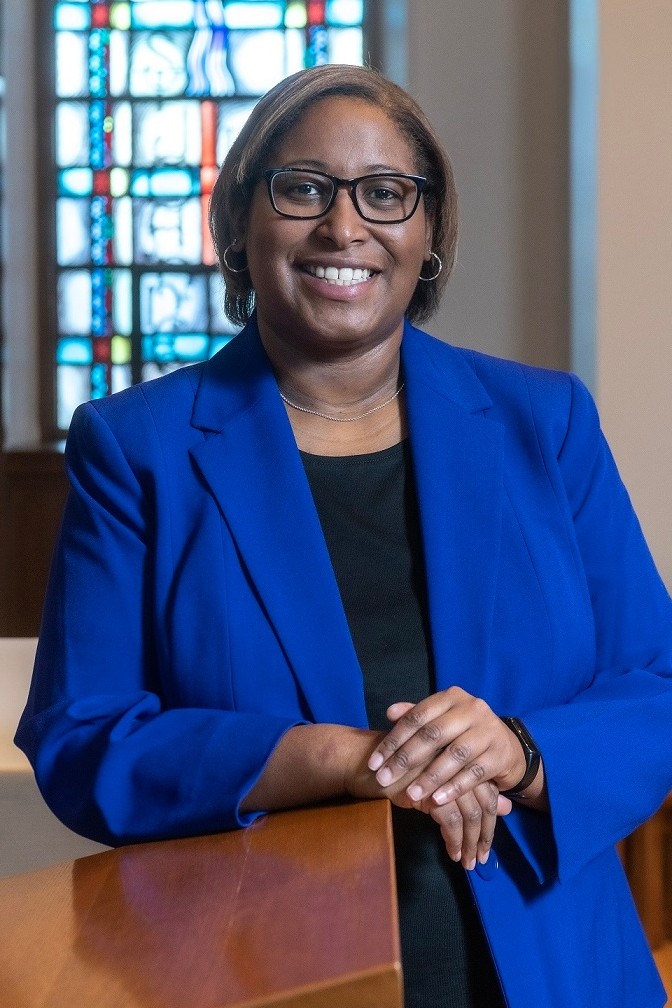

Assistant Professor Heather DuBois, left, and Associate Professor Jaime Waters (Photos by Lee Pellegrini)
Suffering and trauma are inescapable parts of the human condition. Interdisciplinary scholar Heather DuBois and Scripture scholar Jaime Waters are two new School of Theology and Ministry faculty members whose teaching and research are connected to the study and understanding of suffering and its theological and ministerial implications.
DuBois, an assistant professor of peace studies, trauma, and spirituality, says it is critical for people doing ministry work to have an understanding of trauma because they are dealing with other people at their most vulnerable, engaging with their identities, hopes, and dreams. “If you're a minister, how does the way that you approach the pulpit, the counseling session, the study group, shift a little bit when you're mindful of how trauma works?”
DuBois’s expertise in trauma-informed theology and peace studies has roots in her early professional experiences in the nonprofit sector at the local and international levels. After graduating from Tulane University, DuBois worked in her home state for the Louisiana Violence Prevention Alliance. “It gave me an insight into the everyday work of people like social workers, teachers, mental health professionals, and first responders who are dealing with violence in direct or indirect ways. I was in awe of the way that they worked with people. So witnessing their work was really powerful for me, and I've carried their experiences, their questions, and their struggles in my mind.”
After earning a master’s degree in conflict resolution from the University of Bradford (UK), she worked at the global organization Tanenbaum Center for Interreligious Understanding, based in New York City, which brought her in contact with peacebuilders from various religious traditions—Muslim, Jewish, Buddhism, and Christianity.
“They were doing everything from peace education, to mediating disputes between armed groups, to trauma healing, to organizing farmers to advocate for their rights. And that's part of what attracts me to peace studies is that it can be so broad, because there's so many ways in which humans are in conflict. I wanted to understand how to think like them, feel like them, talk like them, and be like them. Their work inspired me to go back to school to study theology.”
DuBois obtained a master’s degree in theology and ethics from Fordham University and a Ph.D. in peace studies and theology from the University of Notre Dame. She taught at Stonehill College prior to joining STM last fall.
DuBois’s interest in constructive responses to conflict, trauma, and violence is driven by her desire to prevent suffering. “I went into justice work because I had a heart attuned to suffering. I have always been animated by questions of suffering. If you're interested in suffering, you're going to learn something about trauma. And so trauma studies came to me through the work for peace and justice. And as I bring all of these things together, I see how some of our spiritualities are addressing deep suffering, displacement, exile, and betrayal. We use the language of trauma as a contemporary reality, but it's an old experience.”
That’s where Associate Professor of Old Testament Jaime Waters’s study of suffering is centered: more than two thousand years ago.
She teaches a seminar on the Old Testament prophet Jeremiah, who is also the subject of her forthcoming book. Jeremiah, known as the “weeping prophet,” lived from the late seventh century BCE to mid-sixth century BCE and wrote about events of his time, which included the fall of Judah to the Babylonians.
“He lived during a time of turmoil and a lot of suffering,” said Waters. “His prophetic career spanned some 40 years. He is a critic of how people are living and worshipping. He sees the fall of the kingdom of Judah, the destruction of [Solomon’s] Temple, and people being taken into exile. In Jeremiah’s view and from the perspective of later editors of his book, the people’s suffering has been brought on by themselves, and so they should prepare for it rather than resist it.”
His critical message is not well received, said Waters, and Jeremiah experiences pushback, suffering, and attacks. “He feels like he's a laughingstock in his community. He is attacked by a priest; he's thrown in a cistern to die.”
Jeremiah is also critical of God, added Waters. “He feels like he's been abandoned because he experiences so much suffering. And so he doesn't feel protected in the way that God said God would protect him.
"I also think they [the hopeful chapters of the Book of Jeremiah] can resonate well with people today when thinking about our modern chaos and the suffering we are experiencing, such as the COVID-19 pandemic and the fight for racial justice and equality.”
“[The Book of Jeremiah] flips back and forth between narratives about Jeremiah's life and then prophetic statements that he might have delivered to different communities. It reads a little bit messy, but I think it beautifully expresses the chaos of its time.”
Waters points out that Jeremiah also has chapters that talk about hope, the importance of prayer, and a kind of open, inclusive vision of healing. “Those texts I think were important for people at the time to get through the war and chaos,” said Waters, “but I also think they can resonate well with people today when thinking about our modern chaos and the suffering we are experiencing, such as the COVID-19 pandemic and the fight for racial justice and equality.”
It was her undergraduate experience at Boston College that set Waters on the path to becoming a biblical scholar.
She took Perspectives on Western Culture with Kerry Cronin. She said prior to that class she had not read much of the Bible, but soon discovered exploring the Bible appealed to her theological devotion and her intellectual curiosity. “I really loved the idea of reading texts and thinking critically about them and trying to see what they meant in antiquity and what they might mean to me today.”
Waters took additional theology courses with David Vanderhooft, John Darr, and Pheme Perkins that examined the historical and cultural realities surrounding when the Bible was written. She recalled that’s when she thought: “I'd like to actually do this as a career. I feel called to be a professor.”
She graduated from BC with a double major in theology and philosophy in 2006. She earned an M.A. in religion with a concentration in Bible from Yale University. She holds an M.A. and a Ph.D. in Near Eastern studies with a focus in Hebrew Bible/Old Testament from Johns Hopkins University. Prior to joining STM, she taught at DePaul University.
“If you're a minister, how does the way that you approach the pulpit, the counseling session, the study group, shift a little bit when you're mindful of how trauma works?”
Book Projects
DuBois is writing a book, titled Moving Through Impasse, in which she uses the spirituality of Saint John of the Cross, a 16th-century monk, and the contemporary critical theory of Judith Butler, a well-known American philosopher and gender theorist, to put forth a vision of navigating an impasse.
Rather than thinking of yourself standing in front of a mountain, DuBois contends that it is better to think of yourself in a web.
“We are relational creatures,” she said. “We are, for better and worse, part of complex webs of relationships that are structural, cultural, interpersonal. They are part of our biology, shaped by our spiritualities and our religious traditions. And all of these different relationships are dynamic so they can move in different ways over time. And if we can understand them as dynamic, we have a lot more opportunities to reconfigure our situation and move through what is experienced as an impossible impasse.”
Waters’s book on Jeremiah is going to be published by Liturgical Press as part of its Wisdom Commentary series, which offers a feminist interpretation of every book of the Bible. That means that Waters is reading and commenting on the text with an eye to the ways that women are found in the text and how they might be impacted by the text.
“Some of the imagery in Jeremiah is graphic and honestly kind of offensive towards women,” said Waters. “My commentary tries to wrestle with some of those issues and come up with reading strategies and different ways of interpreting texts that are true to what the text meant historically, but also are attentive to the realities of women today.”
Teaching
In addition to the seminar on Jeremiah, Waters taught Core Narrative of the Old Testament: Genesis to Kings in the fall. She is teaching Introduction to Old Testament and Women in Scripture this semester. The latter course, said Waters, “surveys a variety of women in the Old and New Testaments, those named and unnamed, in order to understand the ways that they are depicted in texts. The course wrestles with difficult depictions, situates passages in their historical, literary, and theological contexts, and offers ways of reading ancient women in a variety of pastoral and academic settings.”
DuBois teaches Impasse and Spiritual Transformation, for which students write about contemporary impasses from which people are suffering, such as immigration in the United States or climate change.
Another of her courses is Conflict Resolution and Transformation. DuBois says that conflict can be understood as neutral—a difference or friction—and that “if we can deal constructively with conflict, we can prevent it from becoming violence.
“I try to help students to shift their frames of reference, to think creatively about conflict,” said DuBois, who cited how trauma can prevent that from happening. “When we're traumatized or stressed, we shift into a mode that is focused on survival, and that doesn't allow us to creatively solve problems.”
Her other courses are Socio-spiritual Care, and Trauma Healing and Prevention.
STM Mission and Community
“I find it exciting to work with the STM students because many of them will be in a ministerial setting, broadly defined,” said DuBois, “and that connects with my own background in nonprofit work. So I feel like it completes the circle.”
DuBois said that she has found that her time in Simboli Hall has pushed her to be better in her theological thinking. “[Students’] questions are coming from a desire to help people. And so that makes me think harder in ways that are important to my vocation. Because if I'm interested in preventing suffering, I've got to be a good teacher.”
As a bridge builder herself, DuBois likes that Boston College is a place that puts value on building bridges across communities. “If you're going to deal effectively with suffering, you need to be willing to think about it, and approach it from different angles. No one discipline's going to solve suffering for us. We've got to work together. It's such an obvious thing, but we don't always do it that way.”
Waters said she was particularly drawn to teach in the STM because she liked the idea of helping people who are preparing for ministry.
“It was really exciting to have an opportunity to come back [to BC] as a faculty member,” said Waters. “I love this community. I love the mission. I love the Jesuit Catholic identity. And I really love the people.”
Kathleen Sullivan | University Communications | April 2023



